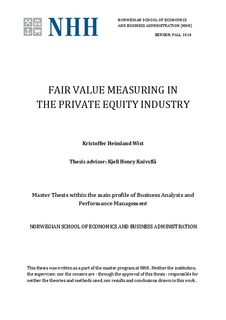Fair value measuring in the private equity industry
Abstract
The objective of this thesis is to address the question of how fair value reporting is
implemented in the private equity industry, and how good fair value estimates (FV) are
compared to the intrinsic value of the investments measured by the transaction price.
Further, the value relevance of book values (BV) and FV has been examined across type
of investment and valuation method.
My data sample shows that the industry’s FV are underestimated in
75 % of the cases. The average deviation from the transaction price achieved in the
market is -25 %. Multiples appear to be the most accurate method to use when assessing
fair value. On average, multiples have a -14 % deviation between FV and transaction
price.
The regression analysis has shown that both BV and FV are value relevant, but FV are
more value relevant than BV. In addition, BV is more value relevant for venture
companies than other companies, while non recognized goodwill is less value relevant
for venture companies.
